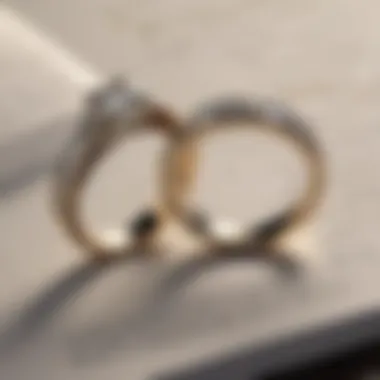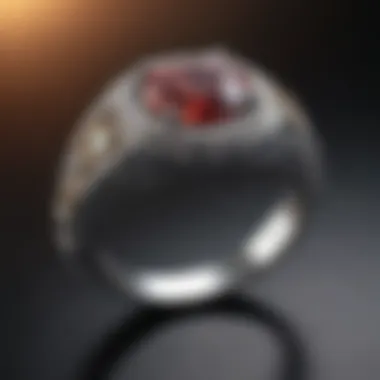Understanding Financing Options for Wedding Rings


Intro
Overview of Financing Options
When it comes to wedding rings, several financing options are accessible to couples. This includes direct purchases, credit cards, layaway plans, through jewelry financing companies, and other mechanisms. Each method carries unique features that can transcend traditional boundaries of spending habits.
Credit Cards
Credit cards are one of the most common ways to fund a wedding ring purchase. However, they come with their own risks. High-interest rates on outstanding balances do exist, and accruing debt can affect overall financial stability. For buyers with good credit scores, using a credit card with benefits like cash back may work favorably.
Jewelry Store Financing
Many jewelry retailers provide financing specifically tailored to purchases. Stores such as Jared and Kay Jewelers often have flexible payment plans, sometimes with periods of interest-free installations. Yet, understanding the terms is essential.
Layaway Plans
Another option is layaway plans. This method allows buyers to make payments over time and pick up the ring once it's paid in full. Layaway does not accrue interest; it may appeal to those with tighter budgets. It bears mention that some retailers impose fees for cancellation.
Preface
Navigating the landscape of financing wedding rings can be crucial for many couples about to embark on a life together. A wedding ring is often more than just a piece of jewelry; it symbolizes love and commitment. However, with varying prices and personal financial situations, understanding financing options is essential. This understanding helps individuals and couples make informed choices about spending and managing their finances effectively.
When considering how to finance a wedding ring, several factors come into play. Budgeting is one of the first concerns. Couples must decide how much they are comfortable spending while ensuring they do not overextend themselves financially. Knowing available financing options, including interest-free plans or installment payment schedules, provides clarity and a sense of ease in making a hefty purchase.
Moreover, one must also take into account the potential impacts on credit scores. How financing a wedding ring changes the credit landscape is significant. This impacts not just the purchase but broader financial health for important future objectives, such as home buying or additional expenditures.
In this exploration of financing options, we will delve into the various methods available to acquire wedding rings, analyzing their benefits and risks. By assimilating the essential information found in this article, readers will be better equipped to manage their finances wisely while pursuing a choice as significant as a wedding ring.
The Significance of a Wedding Ring
The wedding ring carries deep emotional and cultural significance. Not just a piece of jewelry, it symbolizes a commitment and love shared between partners. The ring represents the wedding vows taken, serving as a physical reminder of the promises made. Every glance at it can evoke strong feelings and memories tied to that special day. Moreover, wedding rings reflect the couple's values, style, and story, which can vary greatly from person to person.
Historically, wedding rings date back thousands of years. Ancient Egyptians used rings made from reeds to signify union. Greeks and Romans adopted and adorned these symbols using more robust and durable materials like precious metals. Today, rings continue to evolve, incorporating personal significance with fierce originality in design and gemstones.
From an emotional standpoint, wedding rings often serve as heirlooms, passed down generations. Their inherent value thus rises with each story attached – both sentimental and potentially financial. A well-chosen wedding ring effects unity while celebrating individuality and shared goals.
When couples consider their wedding ring within the larger context of their wedding budget, the significance becomes multi-faceted. The process of selecting the ring promotes collaboration in values and aesthetic choices within the relationship. The act of choosing together can foster open communication, setting the tone for a stronger future.
Key Points about the Significance of a Wedding Ring:
- Symbolism of Commitment: Represents the promises made between partners.
- Cultural Heritage: Reflects historical customs and modern trends alike.
- Personal Value: Decorative choices can be a tributes to individuality and unity.
- Emotional Connection: Serves as a reminder of wedding vows, potentially an heirloom.
As engaged couples navigate financing options, understanding this significance underscores the decisions they will make. Choosing a meaningful ring first touches upon their vision for marriage, afterwards transitioning to practical considerations.
“The wedding ring transcends its material value, embodying love and a relationship's core essence.”
Understanding its importance informs choices that resonate personally. Couples often desire to align financial options with this sentiment, resulting in a more fulfilling purchase experience. In essence, while financing provides necessary support, the true worth of the wedding ring is found in its symbolic impact.
Budgeting for a Wedding Ring
Budgeting for a wedding ring is a vital consideration in the jewelry purchasing journey. Effective budgeting not only helps in aligning your financial capacity with your desired purchase, but it also sets a foundation for future financial stability. By discerning your expenses and priorities, you can ensure that the ring you choose will hold both symbolic value and financial feasibility. A clear budget will help in avoiding strain because wedding costs can quickly escalate when one is not careful or informed.


When developing this budget, it is essential to keep in mind various aspects. These aspects range from the cost of the diamond or gemstone itself to the setting, insurance, and both sales tax and possible financing charges. Knowing the totality of costs in advance enhances the purchasing decision. It allows couples to focus on what rings are realistic options considering their finances. Understanding reputable pricing within the market will significantly enrich this process, given that different jewelers have alternative pricing structures and services.
Setting a Realistic Budget
A realistic budget begins with situational awareness. With rings being not only emotional investments but significant financial ones, it is crucial to recognize genuine limits dictated by personal circumstances. Setting a good budget entails:
- Evaluating savings and income: Understand what you can comfortably afford without jeopardizing essential living expenses.
- Researching average ring prices: Gemstone enthusiasts should look into current market rates. Knowing the going costs of diamonds or specific gemstones will aid the budgeting phase.
- Including additional costs: Allocate funds for potential costs like resizing, custom designs or specific insurance against loss or damage.
Keep in mind that the right ring needn’t mean picking the most expensive option. What truly matters is how tha ring resonates with personal values and compatibility with the financial plan.
Determining Your Spending Limit
Determining a specific spending limit is key to navigating through different choices available in the market. A set limit helps in making decisive choices without overcomplication, freeing you from uncertainty and pressure. The following factors will help in establishing that limit:
- Monthly budget statement: Assess your income versus expenses on a month-by-month basis. Consider what could potentially be reallocated toward ring expenses.
- Financing options awareness: Knowing how financing mechanisms work may increase your purchasing power. Determine acceptable terms related to any interest rates or payment programs you may want to consider.
- Timing considerations: Consider when you intend to make the purchase. Seasonality in commodity pricing can be impactful. For instance, certain times of the year may yield better deals compared to others.
- Evolving preferences: Should you engage heavily in specific gemstone collections or unique designs, consider how this impacts your commitments over your defined limit.
Understanding where you stand financially empowers consumers to pursue meaningful jewelry without overtaking the necessary financial boundaries, delivering satisfaction, rather than debt.
Financing Options Explained
Financing a wedding ring is important because for many couples, it represents a significant financial commitment. Understanding various financing options can help buyers make a decision that suits their needs while managing their budgets effectively. In this section, we delve into specific financing options, exploring their benefits, considerations, and potential impact on one’s financial health.
Interest-Free Financing Plans
Interest-free financing plans allow couples to make their purchase without accruing additional costs from interest. These plans are usually promotional offers made by jewelers or retailers to attract buyers by distributing payments over time.
To qualify, buyers typically need to meet specific criteria or spend a certain amount. Before entering into such an agreement, it is essential to closely examine the terms and conditions. Hidden fees or penalties for missing a payment can turn a seemingly good deal into a burden. An encourang recommendation is to plan the payment timeline and ensure you stick to set payment deadlines.
As you step into interest-free plans, remember that missed payments often come with hefty charges that may outweigh the initial benefits.
Traditional Installment Plans
Traditional installment plans represent a more structured option for financing a wedding ring. In these agreements, payments are divided into fixed amounts over a specified time frame, commonly spanning months or even years. This can provide clearer budgeting to couples, as consistent payment schedules allow for greater planning in overall finances.
Unlike interest-free options, traditional installment plans often incur interest. Therefore, it is critical to evaluate the effective annual percentage rates (APRs) attached to these plans. Calculate overall costs to ascertain whether the advantage of spreading the payments justifies the interest addition. Negotiating terms can also yield favorable changes, so don’t hesitate to discuss offers further.
Layaway Programs
Layaway programs provide an alternative strategy where buyers reserve their chosen items by making initial payments towards the total price. This approach enables couples to secure their desired ring while making smaller, manageable contributions over time until the total purchase price is met.
The primary advantage here is that the buyer does not take possession of the ring until it is fully paid off, which minimizes testing the budget severely upfront. However, be cautious of cancellation policies, which may include fees and loss of paid amounts should you opt-out of the purchase.
In summary, exploring financing for wedding rings requires finesse. Couples must evaluate options according to their unique financial situations. By assessing key factors such as interest rates, payment timelines, and essential terms, a more informed decision can be reached.
Credit Impact Considerations
Understanding the financial implications of purchasing a wedding ring is crucial. One key aspect that can often be overlooked is the impact of financing on one's credit. Selecting a method to finance a ring doesn’t just amplify immediate affordability; it also influences the long-term credit profile of the individual involved in the transaction. Therefore, couples must grasp these implications to make informed decisions for future financial health.
Understanding Credit Scores
A credit score acts as a numerical representation of an individual's creditworthiness. This number usually ranges from 300 to 850, and it is assembled based on several elements:
- Payment history: Ensures that bills and debts are paid on time.
- Credit utilization ratio: Represents how much credit an individual is using compared to their total credit limit.
- Length of credit history: Takes into account how long past accounts have been in operation.
- Types of credit: Looks at the mix of accounts, including revolving credit (like credit cards) versus installment loans.
- Recent inquiries: Highlights how often an individual sought new credit recently.


Individuals might find that minor changes in their finance behavior can considerably affect their credit scores. Before undertaking a purchase like a wedding ring, consider checking your score, as higher scores usually yield better financing offers.
The engagement with different financing options can either positively or negatively influence this score, making awareness critical.
Effects of Financing on Credit
Financing a wedding ring may provide immediate satisfaction but can carry longer-term risks or benefits:
- Possible increase in credit utilization: If you use a credit Card for a sizable purchase, this could raise your credit utilization ratio. Ideally, it should stay below 30% for favorable rates.
- Impact on score due to credit inquiries: Financing options that necessitate multiple credit checking can lead to multiple hard inquiries. Each hard inquiry may temporarily lower your score.
- Timeliness in payments: Repaying the financing on time could enhance credit score. Missing payments could significantly affect it, expanding interest rates and debt risk.
Engagement in responsible finance does not only empower an individual’s credit health; it can ultimately lead to an array of opportunities down the line. Being informed about your credit standing before sourcing a wedding ring ensures that decisions are not impulsive but carefully evaluated.
Benefits of Financing a Wedding Ring
Financing a wedding ring can open many doors for couples seeking the perfect symbol of their commitment. Often, purchasing rings involves significant expenses that may not fit neatly within a short-term budget. Assessing the benefits of financing can provide couples with better insights, ensuring they make informed decisions tailored to their financial circumstances.
Flexible Payment Options
One of the most compelling reasons to finance a wedding ring is the variance of payment plans available. Flexible payment options mean that couples can choose a plan that aligns with their cash flow and financial situation without compromising the quality of the ring.
Many lenders offer plans with small monthly payments, which can ease financial strain. Options may include:
- Interest-free periods: This allows the couple to pay off the ring within an agreed timeline without accruing extra costs.
- Extended financing terms: Some stores provide lengthier financing periods at lower monthly costs.
- Customizable plans: This flexibility enables couples to adjust payment amounts based on income changes or windfalls.
Being able to choose a payment option that suits their situation rather than stretching their budget can lead to a more satisfying purchase experience.
Accessibility to Higher Quality Rings
Financing also enhances the accessibility to higher quality rings. For many, budget constraints limit options to lesser quality choices. By financing, couples can opt for higher-end materials, intricate designs, and unique craftsmanship that they may not afford outright.
Investment in quality often leads to:
- Longevity: High-quality rings typically offer durability, reducing the likelihood of needing repairs or replacements.
- Timelessness: Rings made from superior materials maintain aesthetic appeal, making them valuable for future generations.
- Appreciation: Quality pieces often hold or increase value over time, noting potential benefits for later.
In summary, couples can create an emotional investment without immediate financial burden, allowing a celebration of their love story through extraordinary craftsmanship in wedding rings. This access to better options can be both practical and deeply meaningful.
Remember: Making informed financial decisions means knowing what options are available and how they affect your financial future. Whether through flexible payments or access to higher quality pieces, understanding these benefits can guide couples to a gratifying selection.
Drawbacks of Financing a Wedding Ring
Understanding the drawbacks of financing a wedding ring is essential for couples preparing for marriage. While financing can make an important purchase seem more manageable, it carries inherent risks that demand careful consideration. The pitfals of these financial arrangements can overshadow the initial appeal of more affordable monthly payments. Therefore, it is crucial to explore the implications of financing and ensure that couples make informed decisions tailored to their financial situations.
Potential for Higher Costs
When deciding to finance a wedding ring, one must consider the potential for higher overall costs. Financing options, especially those that involve interest, can significantly increase the total amount you end up paying. The advertised purchase price may be deceiving. Factors such as interest rates and handling fees can inflate this figure drastically.
- Annual Percentage Rate (APR): Retailers may offer financing at enticing low rates, but buyers should always ask for the APR. A high APR, compounded over time, could double the original cost of the ring.
- Hidden Fees: Couples often overlook different types of fees associated with financing. Examples might include setup fees, service fees, and payment processing fees. Collectively, these can elevate expenses further.
It is important for couples to measure the achievable benefits of financing versus possibly waiting until they can pay upfront. A financial assessment may show that saving for a few extra months allows one to possibly afford a higher quality ring without maintenance payments. The few months spent saving might be worth the extra craftsmanship, as one may remove regret of overextending ultimately.
Risk of Debt Accumulation
Another drawback of financing a wedding ring is the risk of debt accumulation. Couples may find themselves buried in debt sooner than they expect due to the respective financing plans they select. This should raise a few red flags:


- Monthly Payment Obligation: A monthly payment can seemingly fit within a monthly budget initially. However, unexpected circumstances can arise. Job loss or health emergencies could potentially place financial strain—making a seemingly manageable expense become dauntingly burdensome.
- Credit Utilization Impact: Utilizing a financing plan often results in new credit inquiries, which can affect the balance and utilization ratios on your credit score. Having too much external debt can trigger issues beyond just your engagement ring purchase—potentially complicating future large purchases, including a home or car credit line.
As to be noted, solid financial habits should always prioritize factoring monthly expenses and decluttering debts where possible. Being surrounded by more liabilities only endangers opportunities for broader, long-term goals. Couples should exercise caution in the face of fillling future lives with unforeseen burdens.
Alternative Payment Methods
When couples consider financing options for a wedding ring, exploring alternative payment methods is essential. These methods can provide more flexibility compared to traditional financing solutions. Understanding these alternatives will help couples make decisions that align with their financial goals and capabilities.
Saving for the Ring
Saving for a wedding ring allows couples to purchase their desired piece without incurring debt. This method emphasizes discipline and planning.
- Establish a Savings Goal: Couples should determine how much they plan to spend on the ring. Knowing the goal fosters a focused saving strategy.
- Create a Saving Plan: Set aside a specific amount each month towards the purchase. It can be helpful to automate this process, making saving effortless.
- Open a Dedicated Account: Consider starting a separate savings account specifically for the ring. This helps avoid dipping into the funds for unexpected expenses.
- Cut Back on Expenses: Assess monthly spending to find areas where savings can be redirected. This could be dining out less frequently or skipping some subscriptions.
By committing to saving, couples not only build their financial resilience but also have a greater sense of satisfaction and accomplishment upon purchasing the ring.
Using a Credit Card
Utilizing a credit card can be another viable option for purchasing a wedding ring. However, it is important to approach this method carefully to avoid falling into debt.
- Find the Right Credit Card: Look for cards offering rewards, cashback, or low-interest rates for purchases. Many banks and financial institutions provide options tailored to such needs.
- Understand Payment Terms: Know the interest rates associated with the credit card. Heavy interest can inflate the actual cost of the ring beyond its original price.
- Pay the Balance Promptly: If utilizing a credit card, it is prudent to pay off the balance as soon as possible, ideally before interest accrues. This prevents higher charges in the long run.
- Consider Cash-Back Options: Some cards offer cash back incentives which can benefit couples planning for the future markets and expenditures.
While using a credit card gives immediate purchasing power, it requires a disciplined repayment plan. Couples should ensure they only spend what they can afford to pay off quickly to avoid detrimental debt.
Engaging with alternative payment methods can lead to a smarter financial choice, allowing couples to enjoy their products while bein budget-conscious.
Choosing a Reputable Jeweler
Selecting a jeweler for purchasing a wedding ring is a significant decision. This choice can directly influence not only the quality of the ring but also the overall purchasing experience. A reputable jeweler is essential for multiple reasons, from ensuring the authenticity of gemstones to offering good warranties on their products. As you embark on this journey, understanding how to find and assess a trustworthy jeweler can save you both time and potential regret.
Researching Jewelers
When you are ready to select a jeweler, it is advisable to do thorough research. Begin by looking at the background of various jewelers within your locality. It is crucial to distinguish between well-established businesses and newer entrants who may lack a proven track record.
- Check Credentials: Determine if the jeweler is certified by reputable institutions like the Gemological Institute of America or the American Gem Society. Certification can indicate a level of expertise.
- Visit Physical Locations: Whenever possible, visit several jewelry stores in person. This enables you to assess the quality of their products and the knowledge of their staff.
- Examine the Selection: A jeweler with a diverse selection can often provide you with better insights into what is available and potentially help in finding the perfect ring.
Reading Customer Reviews
In today’s digital age, customer feedback serves as a valuable resource when evaluating a jeweler’s reputation. Websites and social media platforms can offer credible insights into past customer experience.
Customer reviews can reveal hidden aspects about service quality that one may not discover until it’s too late.
- Online Ratings: Websites like Yelp and Google Reviews host compilations of users' experiences. A jeweler with consistently high ratings is worth considering.
- Social Media Insights: Platforms like Facebook and Reddit can also present unfiltered opinions from previous customers. Engage in conversations on these platforms to gain things you may otherwise overlook.
- Word of Mouth: Don't underestimate the power of personal recommendations. Regardless of online reviews, personal experiences can provide rare insights you may need to weigh all options.
In summary, investing time in researching jewelers and critically analyzing reviews enables you to make a more informed purchasing decision.
End
In this article, we have explored the intricate topic of financing options available for wedding rings. Weddings are significant milestones, often symbolized by the exchange of rings. Given their importance, understanding how to finance these purchases is vital for both practicality and emotional peace of mind.
First, the consequences of your financial decisions play an important role. You have multiple financing options, like interest-free plans and traditional installment payments. Each type presents its unique benefits and drawbacks. By consciously considering your choices, you can manage your finances better.
Furthermore, we discussed budgeting strategies in-depth. A realistic budget allows couples to navigate this significant purchase while ensuring financial stability. The budgeting section reminds readers that extended planning can make a substantial difference.
Understanding credit scores and their implications on the financing methods chosen is also crucial. A strong credit score can facilitate access to better financing terms. Thus, putting focus on building and maintaining good credit should never be overlooked.
Be cautious of the potential pitfalls that come with financing wedding rings. Costs can easily creep higher when you add interest rates or fees into the mix. Developing a keen understanding of these potential consequences helps avoid unexpected financial strain later on.
Lastly, broader alternative payment methods were covered. Whether opting to save for the ring or using a credit card wisely, making informed choices can lead to positive long-term outcomes.







